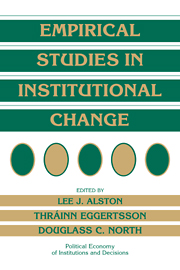Book contents
- Frontmatter
- Contents
- List of contributors
- Series editors' preface
- Acknowledgments
- Introduction
- A note on the economics of institutions
- Empirical work in institutional economics: an overview
- 1 Toward an understanding of property rights
- Economic variables and the development of the law: the case of western mineral rights
- 2 Impediments to institutional change in the former Soviet system
- Why economic reforms fail in the Soviet system: a property rights–based approach
- 3 Transaction costs and economic development
- Public institutions and private transactions: a comparative analysis of the legal and regulatory environment for business transactions in Brazil and Chile
- 4 The evolution of modern institutions of growth
- Constitutions and commitment: the evolution of institutions governing public choice in seventeenth-century England
- 5 Regulation in a dynamic setting
- The political economy of controls: American sugar
- 6 Price controls, property rights, and institutional change
- Roofs or stars: the stated intents and actual effects of a rents ordinance
- 7 Regulating natural resources: the evolution of perverse property rights
- Legally induced technical regress in the Washington salmon fishery
- 8 The politics of institutional change in a representative democracy
- A political theory of the origin of property rights: airport slots
- 9 The economics and politics of institutional change
- Paternalism in agricultural labor contracts in the U.S. South: implications for the growth of the welfare state
- Epilogue: economic performance through time
- Author index
- Subject index
- POLITICAL ECONOMY OF INSTITUTIONS AND DECISIONS
Why economic reforms fail in the Soviet system: a property rights–based approach
Published online by Cambridge University Press: 05 June 2012
- Frontmatter
- Contents
- List of contributors
- Series editors' preface
- Acknowledgments
- Introduction
- A note on the economics of institutions
- Empirical work in institutional economics: an overview
- 1 Toward an understanding of property rights
- Economic variables and the development of the law: the case of western mineral rights
- 2 Impediments to institutional change in the former Soviet system
- Why economic reforms fail in the Soviet system: a property rights–based approach
- 3 Transaction costs and economic development
- Public institutions and private transactions: a comparative analysis of the legal and regulatory environment for business transactions in Brazil and Chile
- 4 The evolution of modern institutions of growth
- Constitutions and commitment: the evolution of institutions governing public choice in seventeenth-century England
- 5 Regulation in a dynamic setting
- The political economy of controls: American sugar
- 6 Price controls, property rights, and institutional change
- Roofs or stars: the stated intents and actual effects of a rents ordinance
- 7 Regulating natural resources: the evolution of perverse property rights
- Legally induced technical regress in the Washington salmon fishery
- 8 The politics of institutional change in a representative democracy
- A political theory of the origin of property rights: airport slots
- 9 The economics and politics of institutional change
- Paternalism in agricultural labor contracts in the U.S. South: implications for the growth of the welfare state
- Epilogue: economic performance through time
- Author index
- Subject index
- POLITICAL ECONOMY OF INSTITUTIONS AND DECISIONS
Summary
INTRODUCTION
In analyzing the disequilibrium characteristics of contemporary Western economies, Mancur Olson (1982; 1984a; 1984b) agrees with the neoclassical macroeconomists in finding that, given the tendencies of markets to clear and given the rational expectations of economic agents, any disequilibrium indicates that all mutually advantageous transactions have not been consummated. Having made this point, however, he asks what can make agents ignore the potential gains from unconsummated transactions and turns his attention toward the structure of incentives, and thus of institutions and policies. Olson insists, and rightly so, that a satisfactory static and dynamic macroeconomic theory has to explain who, among key actors, has the incentive to generate economic growth and equilibrate the economy and who does not. Furthermore, no government, even an authoritarian one, has an incentive to generate serious recessions or disequilibria. Olson (1984a, 637) writes that “even in dictatorial systems, the dictator has an incentive to make the economy of the country he controls work better, since this will generate more tax receipts he can use as he pleases and usually also reduce dissent.”
Olson's arguments about incentives, institutions, and disequilibria offer an ideal basis for an inquiry into why reforms fail in Soviet-type economies (STEs). In Olson's theories of incentives, the old Roman principle of criminal law cui prodest (who gained) is applied to modern economies, and the results suggest that, contrary to widespread opinion, it is not necessarily the “small but powerful group of high and highest leaders” that stands to gain most in terms of power and privilege from “the preservation of the existing order.”
- Type
- Chapter
- Information
- Empirical Studies in Institutional Change , pp. 63 - 91Publisher: Cambridge University PressPrint publication year: 1996
- 3
- Cited by



